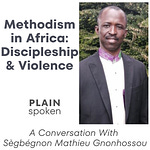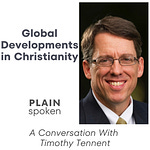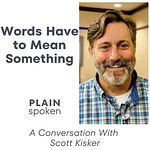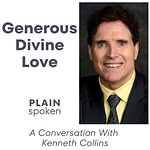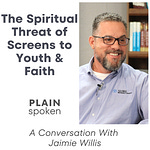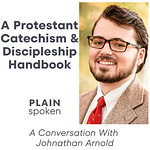Link to David deSilva's "Christian Faith and Doctrine: An Annotated Catechism for the Global Methodist Church" - https://my.seedbed.com/product/christian-faith-and-doctrine-an-annotated-catechism-for-the-global-methodist-church/
For previous conversation on human sexuality in the ancient Roman world -
Partial Summary by Zoom's AI Assistant:
David and Jeffrey discuss David's background and his transition from the Episcopal Church to Methodism. David shares that he became acquainted with Wesleyan doctrine during his doctoral studies at Emory University and found it captured the scriptural vision for discipleship and church well. He has been a United Methodist elder since 1995. David also mentions his early love for Scripture since he was a preteen. They then talk about Ashland Theological Seminary's partnership with the Global Methodist Church. The conversation focuses on David's experience and Ashland's role in serving the next generation of Global Methodism.
Jeffrey agreed with David's thoughts around theological education and suggested that the annotated catechism could help people understand the authentic Wesleyan vision and the importance of being a covenant community rather than a club.
David and Jeffrey discussed their differing views on atonement theory, particularly penal substitutionary atonement. David expressed his belief that this theory has risen to prominence at the expense of other scriptural expressions of Christ's spiritual achievement on the cross. He emphasized the importance of seeing God's action in Christ as a way of extending welcome and embrace to a distant and alienated humanity. Jeffrey, on the other hand, argued that penal substitutionary atonement is a crucial aspect of understanding salvation, as it involves God assuming all roles necessary for salvation, including the sacrifice and the wrathful, angry God.
They discussed the importance of examining and re-evaluating the theological foundations of the Global Methodist Church (GMC). They agreed that the church needs to revisit its doctrines and practices, particularly those that have been inherited from the United Methodist Church (UMC). They highlighted the need for a more robust Biblical hermeneutic and the importance of understanding the vision of the church. They also discussed the need for members to immerse themselves in John Wesley's sermons and theology to better understand the Methodist movement. The conversation ended with a discussion on the language used in the catechism, with David emphasizing the importance of receiving the Holy Bible as the true rule and guide for faith and practice.
They discussed the authority of Scripture and the dangers of swinging too far in either direction. David expressed his concerns about affirming inerrancy, emphasizing that the text should always be more important than doctrines about it. He also criticized the United Methodist Church for disregarding parts of Scripture in their practice. Jeffrey agreed with David's critique and asked for examples of leaders who embody honesty before God and Scripture. David, being out of touch with the political scene of leadership, couldn't provide specific names but mentioned Craig Keener as an example of a scholar who lets the text and spirit guide him.
Concerns Over Sin and Grace
Jeffrey and David discussed their concerns about the doctrine of sin and the potential for Pelagianism in the Methodist Church. Jeffrey expressed worry about the church's comfort with the Biblical doctrine of sin, particularly in relation to sexuality. David agreed, noting that many in the church were championing Pelagianism and celebrating humanity's capacity for good. They discussed the concept of prevenient grace, with David arguing that it doesn't imply a specific point at which God's grace intervenes in a person's life. Instead, it emphasizes God's generosity and the availability of salvation to all. They also discussed the importance of acknowledging wrongdoing and the role of conscience in repentance and returning to God. Jeffrey and David agreed that the critique of Andrew was valid, but they also acknowledged the potential for differing interpretations of prevenient grace.
Cultivating Humility and Gratitude in Faith
Jeffrey and David discussed the importance of acknowledging one's own depravity and sinfulness in order to cultivate humility and gratitude towards God. They agreed that without a proper appreciation of their own sin, gratitude towards God would be lacking. David emphasized the need to identify specific points of non-alignment with God's vision and to understand the ugliness of their own sin. They also discussed the role of the Holy Spirit in leading them into all truth and holiness, and the importance of living as those who believe. The conversation concluded with a prayer for the audience, asking for help in becoming vital communities of disciples where God's transformation is seen in their lives.



